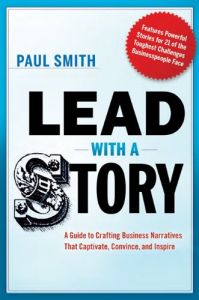Únase a getAbstract para acceder al resumen.

Únase a getAbstract para acceder al resumen.
Paul Smith
Lead with a Story
A Guide to Crafting Business Narratives That Captivate, Convince, and Inspire
AMACOM, 2012
¿De qué se trata?
Put away the PowerPoint, graphs and charts. If you want people to listen, tell them a story.
Recommendation
Once upon a time, young manager Paul Smith worked diligently to prepare a slide presentation for the CEO of Procter & Gamble, A. G. Lafley. To Smith’s dismay, Lafley sat with his back to the screen and didn’t glance at the slides, choosing instead to focus solely on Smith. This taught Smith a valuable lesson: A fact-based pitch never works as well as a story. In this helpful manual, Smith offers more than 100 stories readers can use in a variety of business situations. He teaches the basics of storytelling, including examples and exercises. Smith’s easy and absorbing manner draws you into each tale. getAbstract recommends that managers, salespeople and presenters read this charming compilation, from its useful instructions all the way to its happily ever after.
Summary
About the Author
Paul Smith, a public speaker and leadership coach, is director of Consumer & Communication Research at Procter & Gamble.


















Comment on this summary